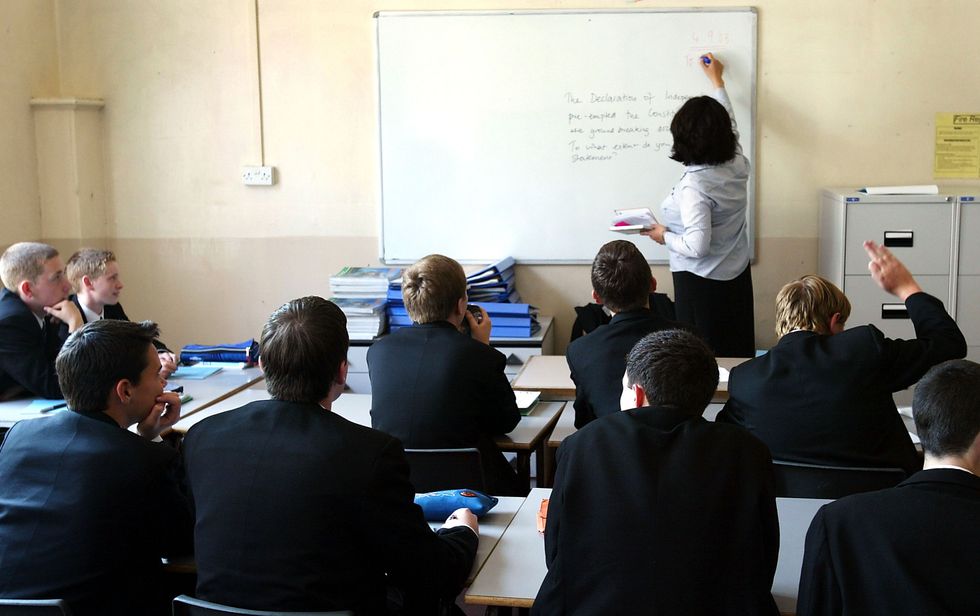School summer holidays would be drastically cut under new recommendations

A cut to the summer holidays could coincide with half-terms being extended to two weeks
Don't Miss
Most Read
Schools in England should drastically cut the length of summer holidays to tackle education attainment divides, a report has claimed.
The Nuffield Foundation will next month release a report calling for a radical overhaul of the school calendar.
It suggested the current structure has been “stuck in place since Victorian times” and highlighted how longer half-term breaks could also prove beneficial.
The report will suggest reducing summer holidays from six-weeks to just four and extending half-term breaks from one-week to a fortnight.

The report will suggest reducing summer holidays from six-weeks to just four and extending half-term breaks from one-week to a fortnight
|GETTY
University of Exeter’s social mobility professor Lee Elliot Major claimed reforming the calendar would produce an effective and low-cost way of tackling the educational divides.
Attainment divides grew drastically during the coronavirus pandemic, with remote learning proving detrimental for many youngsters.
Major said: “Spreading school holidays more evenly across the year makes complete educational sense: improving the wellbeing of pupils and the working lives of teachers at no extra cost, balancing out childcare costs for parents, and potentially boosting academic results for many children.
“Reducing the summer holidays from six weeks to four weeks would still provide adequate time for teachers to recuperate, while two-week breaks during the February and October half-terms would give much-needed time off during the most gruelling parts of the academic year.”
LATEST DEVELOPMENTS:
Children could see their summer holidays cut in a bid to tackle the current attainment divide
| PAThe report is expected to suggest pupils from financially-disadvantaged backgrounds find it more difficult to get back to learning after lengthy breaks.
Teachers also report more behavioural and wellbeing issues immediately after the summer break.
The Welsh Government is mulling over similar reforms ahead of the 2025/26 academic year.
Some school trusts and local authorities in England have already adopted a two-week autumn half-term break or brought in staff training days into one-week rather than spreading them across the entire year.
 A teacher next to piles of classroom books | PA
A teacher next to piles of classroom books | PAUnity Schools Partnership claimed its trial with longer half-terms last autumn results lower levels of truancy.
However, the multi-academy trust also conveyed objections made by parents due to childcare difficulties.
Teachers remain divided on the suggestion of altering the academic calendar.
A recent survey conducted by Teacher Tapp found 33 per cent backed keeping six-week summer breaks, 35 per cent wanted it cut to five-weeks and 29 per cent supported four-week holidays.
 A wide-view shot of teenage music students in a classroom | GETTY
A wide-view shot of teenage music students in a classroom | GETTYLevelling Up Secretary Michael Gove, who served as Education Secretary under David Cameron, previously voiced support for moving away from the “19th century” education system.
He enabled free schools and academies to use more freedom, including with their own calendars.
Geoff Barton, the general secretary of the Association of School and College Leaders, said: “Changing the length of the summer holiday is an idea that has been posited for many years and inevitably there are a range of different views.
“There is some evidence that suggests changes could be beneficial to pupils and parents, but other research has been far less conclusive.

Michael Gove spoke about the '19th century' education system during 2013
| PA“It’s important that the impact of any changes are properly considered and must not be rushed into.
“The Nuffield Foundation’s report identifies some very real issues, including the growing mental health crisis and the disparity between disadvantaged pupils and their peers.
“It’s possible that changes to the school calendar could ameliorate these problems to some extent.
“But it could also prove a huge energy-sapping distraction from the most pressing issues of recruitment and retention, special-needs provision and funding for education.”











